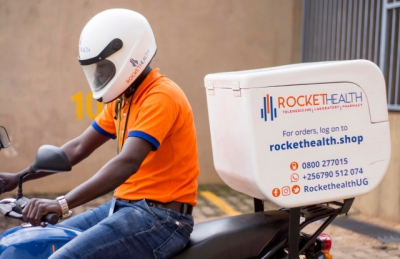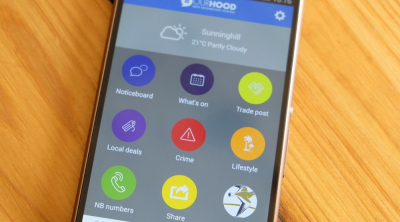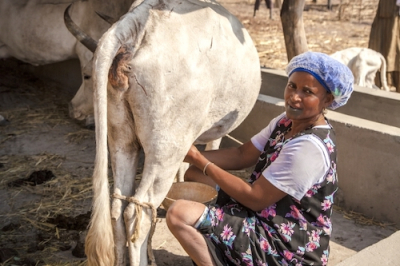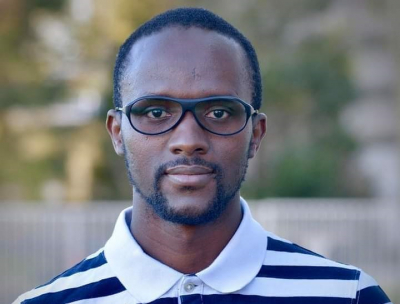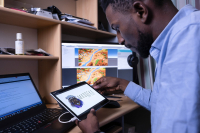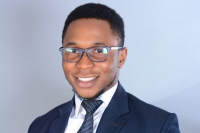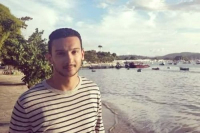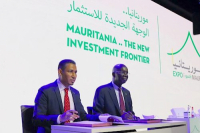In a few years only, this Sudanese lawyer built a flourishing startup, Alsoug, in a country that was under an international embargo for many years. Now, insatiable, she yearns to expand across the rest of Africa.
After staying abroad for some years, for studies and work, Tarneem Saeed probably never imagined returning to her country, Sudan, whose economy was shaken for about 30 years by conflicts and placed under an international embargo. Yet, she is now one of the most powerful businesswomen in the country. The entrepreneur founded Alsoug, Sudan’s largest online marketplace, offering e-payment and logistics services.
Saeed left Sudan for Canada at age 14, to further her education. After graduating from the London School of Economics and Political Science (LSE), she worked as a corporate lawyer at Allen and Overy, a law firm with operations in over 60 countries.
In 2014, while in Sudan on personal business, she noticed how disconnected the country was from the digital economy. "People and businesses weren’t harnessing the full power of the internet. Coming from London, Sudan just felt empty. One of the things that irked me the most was how difficult it was to find out the price of anything. You had to ask someone to get the price of a car, house, or even cattle,” Saeed said.
She launched the Alsoug project in 2015 to tackle the situation. Initially, it was a brokerage platform where consumers could check the prices of goods and services, and where sellers and buyers could chat. In 2016, despite the poor internet access in the country, she expanded the platform by introducing classified ads. Over the years, Alsoug’s business model evolved and the platform came to integrate online sales and other tools including an e-payment solution called Cashi.
In six years only, Tarneem Saeed made Alsoug the country’s leading e-commerce startup, notably by raising a lot of money from venture capitalists. Very recently, in October, the company announced the close of a $5 million fund, raised from Egypt's Fawry and other investment structures – the first operation of this kind after the lifting of economic sanctions against the country in 2020.
Despite the persistent challenges female entrepreneurs face in Sudan, Tarneem Saeed is determined to go much further in developing Alsoug. She is getting ready to break into the fintech market with a national payment system that will allow for quick, easy, and secure transactions for all Sudanese.
Aïsha Moyouzame
Senegalese multiple award-winning agtech startup Tolbi announced plans to raise $500,000 this year to develop its activity. Tolbi, which means field in Wolof, was founded by Mouhamadou Lamine Kébé, a graduate of the Dakar polytechnic school who majored in telecom network systems. Lamine initiated the idea in 2019 with three of his classmates to tackle the water management problems experienced by Senegalese farmers.
Tolbi offers a set of connected objects based on artificial intelligence and edge computing to facilitate field irrigation and improve agricultural yield. "We use drones, satellite imagery, and connected objects with moisture sensors to allow the user to have real-time information about the water and fertilizer needs of their fields. This helps optimize irrigation and improve yield. It makes it possible to reduce water and fuel inputs upstream, thus reducing production costs," Mouhamadou Lamine Kébé explained.
Tolbi’s team of engineers process the data collected by sensors through AI algorithms to extract key information for decision making. The analyzed data is made available to users via dedicated apps to enable them to make a decision. The solution is accessible to all farmers, even those with modest incomes or illiterate, via a mobile phone and a SIM card. All the farmer has to do is dial the device number and interact with a voice command system in Wolof or Pulaar, two languages spoken in Senegal.
"We have succeeded in optimizing agricultural yields by up to 30% while reducing water losses by up to 60%," Lamine Kébé said. The startup has grown well since its launch and now offers many other services such as plant counting, land shaping, yield estimation, plant health analysis, and weed analysis.
The strong impact Tolbi has on agriculture has earned it several awards including the Grand Prix of the President of the Republic for Digital Innovation in 2020. The startup aims to become a leader in smart agriculture in Africa. For the upcoming year, it plans to enter Nigeria, Kenya, Algeria, and Morocco.
In 2018, agriculture contributed 9.4% to Senegal's GDP, according to the 2020 report of the National Agency for Statistics and Demography (ANSD).
Ruben Tchounyabe
Digital Health enterprise -The Medical Concierge Group- launched in 2018 its solution to address the problems of the remoteness of health facilities, long waiting lines, low doctor-to-patient ratios, and the lack of access to credible health information. Called Rocket Health, the service is the fruit of a collaboration between Dr. Davis Musinguzi, Dr. John Mark Bwanika, Dr. William Lubega, and Dr. Hope Achiro. It is accessible 24/7 via USSD and SMS on basic mobile phones, WhatsApp, or directly online on smartphones, tablets, or computers.
“The doctor-patient ratio in Uganda now stands at one to twenty-five thousand. That means so many people cannot access quality health care, and it’s not only the doctors. The pharmacists and the pharmacy services or the laboratory services are also really difficult for most people to come by. And if they do, there are long waiting lines in the traditional settings,” said Hope Fortunate Achiro, Director of pharmacy services at Rocket Health.
Rocket Health’s users can get teleconsultation with doctors, contact a medical team for home lab samples, have medications delivered, and have children vaccinated, among other things. They can also, through the call center, get support on sexual and reproductive health (SRH) issues or access an e-shop where they can buy and have delivered products such as condoms, emergency contraception, HIV self-tests, etc. The services are delivered in a private and confidential environment.
Rocket Health is currently available in Kampala. The solution recently received six months of incubation in 2021 at the Next Health Accelerator (NHA) -a health innovation accelerator designed by Intrepid Entrepreneurs for African entrepreneurs- and a $15,000 seed fund. Its promoters want to expand across the country, starting with Greater Kampala, then enter Kenya and Nigeria, where the service already has a registered legal presence. Rocket Health has won several awards, including Uganda's 2021 Start-up of the Year and 2021 Best Health Startup of the Year at the Kampala Innovation Week. The event was organized in partnership with the United Nations Capital Development Fund (UNCDF).
Ruben Tchounyabe
In South Africa where it was created and launched, more than 1,000 people have joined the app in the past six years and it is gaining much interest in other countries like Nigeria, Kenya, and Botswana.
Created in 2013 – by Bruce Wood and William Mellor – and launched in 2014, OurHood is a website and mobile app that fosters communication between people living in the same vicinity or neighborhood in South Africa. “We took the best of Facebook and WhatsApp and created OurHood. There are examples of this working elsewhere in the world. It’s never been done here and we thought this is the best opportunity to create something for South Africans,” said Wood, MD of OurHood.
Available on Play Store for free, OurHood has four tabs. The "General Information" tab allows users to share information about the community or neighborhood; "Alerts" enables them to note a safety issue or any other important information. "Events" houses all scheduled events, and "Business" identifies and locates businesses within or near the neighborhood.
There are other (paid) features such as a "directory" which provides access to the contacts of all small business owners listed in the neighborhood, i.e. electricians, plumbers, cleaners, newspaper delivery people, etc. Another feature also lets users directly contact a security agency.
“The way the system works is it feeds off Google. It starts with your physical address, it finds you within that ‘geofence’ that we’ve created. Then to join, you need to get verified,” Wood explained. Thus, no one can register on the app and join a neighborhood without providing proof that they live there. Each user's identity is verified after uploading a utility bill picture, required during the registration process.
OurHood focuses on urban areas, particularly Cape Town and Johannesburg, which have the largest percentage of users. The startup reveals that the app already has about 1,000 neighborhoods in its database and receives five new neighborhood requests per day. The requests are not only coming from South Africa but other countries such as Nigeria, Kenya, and Botswana.
Ruben Tchounyabe
Tunisian AgTech startup Lifeye launched an innovative solution to help farmers in Africa increase their livestock and milk production. The solution was quickly adopted in several countries on the continent. It is an app (MooMe) downloadable for free on Google play store and Huawei AppGallery.
MooMe was designed in 2019 by three entrepreneurs who wanted to address recurrent problems of cattle farming in Tunisia, such as poor fertility and difficulty in detecting early diseases. The services built into the app will help users better monitor cow calving and fertility, and have full control over their animals, including troublemakers. "The most important thing for a breeder is to know when to do artificial insemination. This data allows us to alert him in advance," explained Ahmed Achballah, one of MooMe’s founders and a graduate in applied sciences.
According to Mohamed Kallel, also co-founder of MooMe, the platform offers accurate data and enables the farmer to quickly detect when something is going wrong with his cattle. The app is linked to a connected cow collar, which is equipped with a small sensor that analyzes the level of rumination and movements to identify diseases such as mastitis or lameness. The collar also helps evaluate the animal's fertility period. MooMe collects data via boxes that are installed in the cowsheds. Once collected, the information is translated into algorithms and spreadsheets that are sent back to the startup's headquarters in Tunis, where the platform to which farmers have access is located.
The connected cow collar is sold for TND200 (€62) with monthly subscription bundles. It was tested on farms in the northwest of Tunisia and provided great results. Lifeye claims 2,500 cows registered in its database and more than 1,500 users in Morocco, Algeria, Egypt, Nigeria, Rwanda, Uganda, Kenya, Zimbabwe, and Senegal, in addition to Tunisia. The company has secured financing, last year, from Maxula Seed Fund to improve its app.
Muriel Edjo
After coming up with the idea for his app while being treated in France, he went on to win RFI’s Africa 2020 App Challenge with the project. The platform, already available in Mali and Guinea, is set for expansion across the continent.
On January 18, 2022, Amara Diawara (photo) announced a partnership with Synapse Medicine, a French health software company. This partnership, Diawara said, will allow Afriqcare, the startup he founded with Mariam Coulibaly, to improve the quality of its services.
With his platform, the techpreneur and holder of a Ph.D. in Medicine (from Gamal Abdel Nasser University in Conakry) hopes to revolutionize access to health care in his country, Guinea, and the rest of Africa.
Afriqcare offers online appointment booking, teleconsultation, and tele-expertise services. It also enables doctors to access their patients’ medical records via a health booklet and an e-vaccination record. With approximately 37 medical specialties currently listed on its platform, Afriqcare is already available in Conakry (Guinea) and Bamako (Mali).
The idea for the app emerged in Amara Diawara's mind while he was undergoing treatment for a lung tumor in France, where he had flown to in 2015 to pursue a master's degree in public health. Before that, he was working at the World Health Organization (WHO) as part of the response to the Ebola epidemic that hit Guinea. During his treatment, he discovered the use of digital tools for healthcare monitoring and wanted to apply them in Africa.
"I told myself that we needed to give African patients and healthcare professionals the means to interact with digital tools. When I saw my patients, once they were out of the hospital, I no longer had any information about their journey. That had to change," he explained and so Afriqcare was born in 2020.
Amara Diawara won RFI's Africa 2020 Challenge App award and consequently €15,000 in funding. In February 2021, during the award ceremony, he said he would use the money to develop a new and improved version of the Afriqcare app.
"We will make the application easier to use so that it can be accessed even with low internet speed. The new version will also be more reliable and secure," Diawara declared at the time. He also revealed his ambition to dominate the digital health sector in French-speaking Africa, by 2025.
Aïsha Moyouzame
Very attached to his culture and African traditions in general, Central African entrepreneur Teddy Kossoko founded Masseka Game Studio in 2017 to showcase African culture.
With this initiative, Teddy Kossoko, 27, who has been living in France since 2012, has made himself a place among those who work to promote Africa in the world. The idea came to him while he was finishing a degree in computer science at the University of Blagnac in 2014. He noticed that people who play a lot of video games acquire knowledge about foreign cultures. He then started working on his very first game, Kissoro Tribal Game, which is inspired by Kissoro, a board game very popular in Central Africa and across the continent. The game was released in 2018. For this first project, Teddy received the support of the National Center for Scientific Research (CNRS). He was granted access to the institution’s documentary resources.
In only 2 months, Kissoro Tribal Game has been downloaded more than 13,000 times in about 20 countries around the world. It is available in 5 languages (French, English, Japanese, Russian, Spanish), and has integrated features such as stories to discover, challenges, tutorials, quests, and winning contests, among others.
With Masseka Game Studio, Teddy Kossoko has won many international awards including the "Pitch Your Game" of the Geek Touch in Lyon in 2017, the Tongolo Awards organized the same year by the Sewati Tongolo association. The entrepreneur has also signed many partnerships with international structures, including mobile payment solution Intouch, the CNRS, the Embassy of the Central African Republic in France, and BPIFrance.
These multiple awards and partnerships allow Teddy Kossoko to prepare more ambitious projects and enter new markets. With his team, he is working on the development of new products including a racing game called Cours Didier, Georges d'or -a 3D soccer game featuring a poor young man who wants to become a golden ball, and Imani Imanu and the legend of the Sonni- a 2D adventure game.
"We first need to address the problems of Internet access and train young creators so that they can offer games that meet international standards. African creators are still lagging despite their innovative initiatives,” Teddy said.
Beyond his creations, the game developer is now seeking to boost the initiatives of other African video game studios. He created the African Gaming Networks platform in 2019 to address the obstacles specific to the sector, including its organization, the difficulties of training and monetization of video games. In addition to referencing creators, the network also offers a mapping of the African ecosystem and helps identify talents who need financial support.
Aïsha Moyouzame
Emmanuel Babalola, Africa’s Director at Binance, unveiled plans to make cryptocurrency a mainstream product on the continent. Although the context is quite complex with people's mistrust of crypto, the 27-year-old manager seems determined to achieve his goal.
The former MD of Binance Nigeria, who became head of the company's African division in 2021, plans to increase awareness campaigns and training on the usefulness of virtual currencies. He has already contributed to several education initiatives, including Binance Academy and Binance Masterclass. These programs aim to teach Africans the fundamentals of cryptocurrencies, as well as how to identify scams and seize real opportunities.
“Our top priority is user safety, and therefore we kicked off our education initiative – to teach crypto fundamentals, explain everyday use cases and ensure users know how to avoid scams. We also kicked off a campaign called My Crypto Life, an initiative that spotlights incredible crypto stories from people around the world, showing how crypto can be used by everyday people,” Emmanuel Babalola said.
In Africa, the volume traded by African users on the Binance platform has increased by 589%, the manager claimed. He sees this promising figure as a way to convince skeptics, who are concerned about fraud, capital flight, and environmental damage associated with bitcoin.
The Binance Masterclass estimates that more than 350,000 Africans have benefited from educational resources by 2021. Emmanuel Babalola says Binance is creating the educational infrastructure that Africans need to be financially free and informed. To attract more users, the global digital asset platform is stepping up efforts on the continent, officially becoming a sponsor of the 33rd edition of the African Cup of Nations.
Since 2020, Binance's various programs have benefited more than 541,000 Africans. The new partnership with AfCON, which is one of the most publicized events on the continent, offers an opportunity for Emmanuel Babalola to reach 160 countries and an audience of nearly 300 million people. “Greater blockchain adoption is opening the gateway to more opportunities for many businesses to develop even more blockchain-based applications and create more job opportunities,” he said.
Aïsha Moyouzame
Tunisia features among the top five African countries well prepared for e-governance, according to the UN e-government survey 2020. Although this position may reflect great efforts by the government, challenges remain.
Since 2020, Ahmed Zoghlami has been trying to make administrative procedures a lot easier for the population. He became a reference in administrative guidance in Tunisia with his startup Idaraty.tn. He provides users with help for more than 1,800 procedures in nearly 3,500 public administrations. The idea occurred to him during the pandemic when he noted that travelers coming to the country struggled to get the right information.
"We have listed the necessary papers to be presented at the airport, on the portal. Something, which the National Observatory of New and Emerging Diseases has not managed to communicate properly ... The specific information we provided on the portal interested 10,000 users. A record score, which revealed to us that we should develop this segment that is very useful for the users,” Ahmed Zoghlami says.
Holder of a basic degree in computer science, obtained at the University of Carthage in 2013, Ahmed Zoghlami launched Idaraty with about a decade of professional experience in communication, content management, and digital technologies. A few months after its launch, Idaraty.tn was quickly adopted by the population. Today, nearly 350,000 visitors have already been assisted by the portal, which even translates the various administrative procedures offered in local dialects. Ahmed Zoghlami says his value-added service also contributes to the digital transformation in the country.
Idaraty.tn also provides information on several other services such as Covid-19 screening and the special health measures required for the return of Tunisians living abroad. It integrates a calendar for different fiscal and social events that affect individuals and legal entities, including the dates of payment of tax stickers and tax returns for individuals and legal entities, religious holidays, public holidays, etc.
Aïsha Moyouzame
Mauritania has been launching several e-government development projects since 2020. Indeed, the country’s government, after understanding the importance of modernizing the public administration amidst the Covid-19 crisis, started prioritizing strategic partnerships.
To speed up the digitalization of public services in the country, the Mauritanian government, on 11th Jan 2022, signed two (2) memoranda of understanding (MoUs) with Emirati firms. According to the Mauritanian Minister for Digital Transition, Innovation, and the Modernization of the Administration, the signing took place during the Mauritania Day at the Expo 2020 Dubai currently taking place in the UAE (started on October 21 and ending on March 31, 2022). The official broke the news on January 19.
The first of the two MoUs was signed with Tahaluf Al Emarat, a company that provides smart services and security products. The deal, among others, should help Mauritania simplify decision-making in the public sector, leveraging digital solutions; boost the capacities of its experts in the AI, Internet of Things (IoT), Big Data, and network sectors; as well as improve access to public services via mobile.
The second protocol signed with the Emirati company Serdal Limited is focused on supporting the government in developing market, technical, and operational studies (feasibility studies) related to digitalization in Mauritania. The firm’s expertise will serve for several projects, including the development of e-commerce, digital postal services, and the digitization of Mauritania's border crossings. Both parties involved in the deal will set up a team that will define the terms and conditions of the services offered under this MOU.
A third memorandum was signed with 01 Talent Africa, a company founded by Nicolas Sadirac and Deror Sultan. Under this agreement, Mauritania will get a collective intelligence center called "Zone01". The facility will house a coding school, a professional digital training center, and a digital talent agency.
"These memoranda of understanding are part of the ministry's efforts to consolidate the new digital dynamics recently launched by the government, to foster a smooth, secure and inclusive digital transformation in Mauritania while encouraging digital innovation and making e-governance a tool for modernizing Mauritania’s Administration,” said the Ministry of Digital Transition and Innovation.
Taking advantage of the UAE’s technical expertise to accelerate the digitization of its public services adds up to Mauritania’s multiple efforts to consolidate its digital achievements. Among such achievements, there is the ongoing construction of a Tier III data center and the completion, in December 2020, of a 4,000 km national fiber-optic network. At the moment, the country is fine-tuning its new digital development strategy.
This year, Mauritania plans to digitize 20 basic public services, out of 110 public services which should be digitized by 2025. This was disclosed last December by Abdelaziz Ould Dahi, Minister of Digital Transition, Innovation, and Modernization of the Administration,
Adoni Conrad Quenum
More...
Despite a notable evolution of fintech in sub-Saharan Africa, the Islamic segment of this market has issues taking off. This gap, however, could be exploited by the region for its growth.
Talking about regions that leverage opportunities offered by Islamic fintech (iFintech), Sub-Saharan Africa keeps lagging – according to the Global Islamic Fintech Report 2021. “Sub-Saharan Africa, MENA (ex-GCC) have gaps across the 9 iFintech services segments,” the report reads.
Sub-Saharan Africa (SSA), the report’s authors found, has seven (7) iFintechs - the lowest compared to the world’s other six (6) regions. In detail, SSA has 2 Islamic Fintech firms in the alternative finance category, 2 in deposits and lending, and 1 each in the raising funds, wealth management, and social finance categories. Meanwhile, a region like Europe, which ranked third out of six, has respectively 11, 13, 8, 8, and 4 iFintechs in these same categories.
The findings contrast with the rapid evolution of fintech services - mobile money, and microcredit services notably - in SSA. At the country level, Nigeria has the most iFintechs in Sub-Saharan Africa. In Africa, it is even ahead of countries like Egypt, Morocco, and Tunisia where Islam is more widespread.
According to the report, skill deficit, poor regulation, and insufficient resources are the reasons preventing iFintech from thriving in Africa. However, the authors estimate that by 2025 the fintech market could grow at more than 25% CAGR in Senegal, Tunisia, and Nigeria. A projection that corresponds to a target transaction volume of $2 billion.
Idriss Linge
After using the ASYCUDA computerized customs management system for many years, Guinea now plans to adopt more solutions to make its customs office more efficient.
This year, the Guinean Customs office plans to speed up its digitalization to be more efficient and produce better financial results. Its managing director, Col. Moussa Camara (photo), disclosed this on 26 January 2022 during a ceremony held to celebrate the International Customs Day.
According to Guinea Morning, Camara explained that his administration would continue "to dematerialize clearance procedures in all its offices across the country, extend the payment of duties and taxes online and other modes of payment, extend the possibilities of access to customs computer systems, including through cell phones, continue and finalize the deployment of the electronic platform for foreign trade management in collaboration with the Guichet, and continue the interconnection with the computer system of public and private entities."
In 2011, the Guinean Customs started its digital transformation and in 2015 it switched management systems from ASYCUDA++ to ASYCUDA WORLD. To facilitate trade with other West African countries, which have also begun modernizing their customs administration, the country, over the past years, has been investing steadily in more advanced digital tools.
Moussa Cissé, Guinea's Minister of Budget, was present at the ceremony held on International Customs Day. On the occasion, he said that the 2022 revenue target set for the Customs office was 12,975.746 billion Guinean francs ($1.44 billion), under the forecast budget.
Adoni Conrad Quenum
The World Resources Institute (WRI) announced it has launched, in partnership with the French Development Agency (AFD), a challenge to reward initiatives that aim to transform the transit systems in Africa by utilizing technology.
The DigitalTransport4Africa (DT4A) Innovation Challenge focuses on sustainable mobility initiatives, particularly those related to artisanal or "informal" transport in African cities through innovative digital tools and technologies. It is open to NGOs, research and academic institutions, and private companies. All eligibility and application conditions are available at digitaltransport4africa.org. The deadline for submissions is February 16, 2022, at 11:59 p.m., East African time.
The four best digital innovations, according to the jury, will each receive a $30,000 award to implement a new initiative over 12 months.
The government of Benin has adopted a new five-year multi-sectoral plan for digital migration. For the education component, the government has defined a technical framework to accelerate the digitalization of the sector. A workshop was organized for this purpose on January 27 by the Minister of Digitalization, Aurelie Adam Soulé Zoumarou (pictured).
It was attended by Salimane Karimou, Minister of Nursery and Primary Education; Eléonore Yayi Ladekan, Minister of Higher Education and Scientific Research; and Kouaro Yves Chabi, Minister of Secondary and Technical Education and Vocational Training.
According to Aurelie Zoumarou, the meeting enables participants to set “the fundamentals of the information system to be put in place, as well as the governance and the roadmap of the e-Education project.” She stressed that “per the vision of the government, the e-Education project must optimize learning and foster a better quality of the transmission of knowledge using digital tools.” The e-Education project is a sub-component of the Government Action Program (PAG) 2021-2026, in its fifth strategic axis: "promotion of quality education and technical and vocational training." Accelerating the project will help the government address the challenges faced by the sector during the coronavirus pandemic.
Once implemented, e-Education will contribute to improving the governance and management of education systems, introducing new teaching and learning practices, improving the monitoring and development of learners, making certificates and diplomas more reliable, strengthening teachers' capacities and skills, and improving research.
Adoni Conrad Quenum




